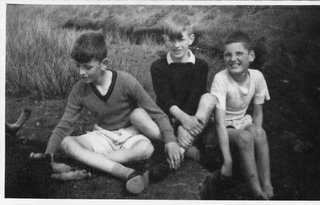Three or four of my mother's sisters were herring girls who worked in various fishing ports down the east coast in the early part of last century. If you don't know who the herring girls were or what they did then you will have to read this book which will tell you all you need to know about them as well as lots of historical, cultural and social history of the herring.
When we were boys herring was often served by my mother. There are many ways to cook it but we mostly had it fried in breadcrumbs, or boiled or salted herring. I remember helping her salt a basin full of herring but never allowed to gut them, in case I chopped a finger off I suppose. The basin was kept in the porch, the coldest room in the house I guess, as no fridges in those far off days. At least not yet in our house, or in our neighbours houses for that matter. Buntàta 's sgadan, (potato and herring). Lovely. My taste buds are awakened by the thought.
Anyway to get back to Herring Tales. I went to the launch of the book when I was up in Stornoway recently. It was written by Donald S Murray who also wrote the play Sequamur which I wrote about in March this year. Donald comes from Ness in Lewis which is why he had a launch in Stornoway Library. I have to say that I would not have expected to be reading a book about herring at this stage of my reading life, given the fact that it's is probably going to be curtailed somewhat. Having said that I'm very glad that I went to his launch that evening in Stornoway and bought his book.
It is very well written, extremely informative and full of interesting stories and history. I have learnt much about herring fishing but especially about the herring girls as I feel an affinity to them and their lives due to the family connection.
I could never understand why the Lewis girls, or so many of them, went to work in the East Coast ports, but now know it was for economic reasons, as pay was higher away from Stornoway. His descriptions of conditions the girls lived in are grim beyond belief and also very sad. They were badly treated and neglected.
You will all be pleased to hear that the girls didn't take it sitting down. Donald describes a number of strikes, including one in Stornoway which the local newspaper described in the following terms "a number of women failed to turnout to their work and the malcontents proceeded to other places and induced - in some cases intimidated - the girls to knock off work" so secondary picketing in Stornoway back then. And the press haven't changed much. Excellent stuff. And I never knew about it till reading Donald's excellent book.
He describes a number of other strikes improvements in their lives, though never enough. There is a great description of a fight between some island fisher boys and locals in Wick. The fight becomes a bit of a riot and sounds like good fun. It started over an orange as these things often do. The island boys seem to have won, which is only as it should be. The fight seems to have been resumed a week later when the army arrived to restore order.
Donald talks about how the girls used to bring back little (or big) luxury items from their trips away which went some way to improve home life in Lewis. My aunty Ina brought back a clock which sat in our living room at home for 100 years and is now in my brother's house in Cupar. A treasured family possession.
Bob Dylan and Bob Marley also get a mention but you will have to read the book to find out why. But his mention if Marley reminded me of the taxi drivers in Cusco, forever playing Buffalo Soldier for me. Well at least seems to me they were playing for me.
So thank you Donald for an excellent book, which I can highly recommend if you're looking for a Xmas present for a loved one this year or even if you're not.
I'm off out to see Brooklyn now so very excited. More later.
Thursday, November 19, 2015
Subscribe to:
Post Comments (Atom)

No comments:
Post a Comment